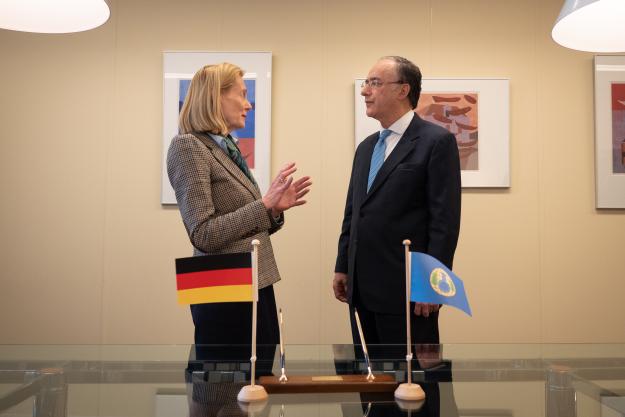
Permanent Representative of Germany to the OPCW, H.E. Ambassador Christine Weil, and the Director-General of the OPCW, H.E. Mr Fernando Arias
THE HAGUE, Netherlands — 7 January 2019 — The Organisation for the Prohibition of Chemical Weapons (OPCW) has received a voluntary contribution of €1 Million from the Government of the Federal Republic of Germany towards the Trust Fund for the Implementation of Article X of the Chemical Weapons Convention (CWC).
The Fund supports the Organisation’s activities in relation to assistance and protection against chemical weapons, while the German contribution aims to enhance the OPCW’s response capabilities against the use of chemical weapons to ensure a swift and effective response to OPCW Member States’ requests.
The donation was formalised with an exchange of letters by the Permanent Representative of Germany to the OPCW, H.E. Ambassador Christine Weil, and the Director-General of the OPCW, H.E. Mr Fernando Arias, which took place on 5 December at the Organisation’s Headquarters in The Hague.
The Director-General expressed: “I thank the Government of Germany for this important donation to strengthen the OPCW’s Assistance and Protection capacity building programmes. This support clearly attests to the strength of Germany’s commitment to the goals of the Convention.”
Ambassador Weil underlined that the contribution aligns with Germany’s intention to increase its support to the OPCW’s capacities to assist States Parties in the implementation of CWC obligations.
Background
Article X of the chemical Weapons Convention (CWC) provides for assistance and protection activities in support of a State Party on whose territory chemical weapons have been used. If there is proof that there are casualties due to the use of chemical weapons and immediate action is called for, the OPCW Director-General is authorised to take emergency measures to provide assistance.
As the implementing body for the Chemical Weapons Convention, the OPCW, with its 193 Members, oversees the global endeavour to permanently eliminate chemical weapons. Since the Convention’s entry into force in 1997, it is the most successful disarmament treaty eliminating an entire class of weapons of mass destruction.
Over 96% of all chemical weapon stockpiles declared by possessor States have been destroyed under OPCW verification. For its extensive efforts in eliminating chemical weapons, the OPCW received the 2013 Nobel Peace Prize.
